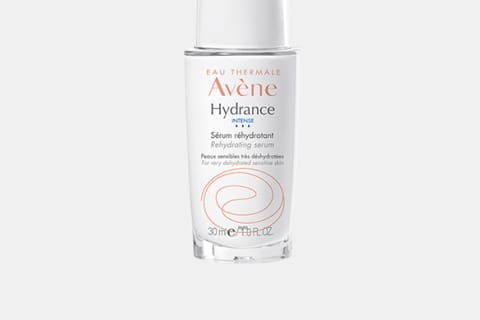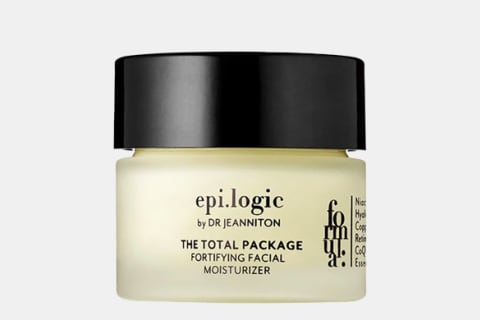Dehydrated Skin: 6 Signs You Have It + How To Get It Back To Its Supple Self

Oh, dehydrated skin: The one skin care woe people tend to groan about on the regular. That's because dehydration spares no skin type—it simply refers to a lack of water in the skin, which anyone (regardless of age, skin texture, or tone) can struggle with.
Although, dehydrated skin looks a little different on everybody, making it all the more difficult to pinpoint and treat. So we got expert intel: Here's exactly how to tell if your skin cells are begging for hydration, plus how to get your skin back to its glowy, supple self.
Advertisement
How to tell your skin is dehydrated.
Some people might experience irritation (typically those with sensitive skin and a compromised skin barrier), while others may see an uptick in oil. Everyone's skin reacts differently, so it's important to figure out what your skin is trying to tell you. "You don't have to have all of these," explains celebrity facialist Joanna Vargas, founder of Joanna Vargas Salons and Skin Care and author of Glow From Within. "Just one can mean dehydration."
That said, here are the most common telltale signs for you to wade through:
Advertisement
It's dull.
If you wake up to skin that's looking a bit blah, you may have dehydration to blame: "Dehydrated skin may look dull, lack radiance, and may appear ashy if you have darker skin tones," board-certified dermatologist Joshua Zeichner, M.D., has told us.
That's because when your skin is parched, it'll focus all its attention on how to grasp more water—basic and essential functions, like cell turnover, are put on the back burner. As a result, you may have a buildup of dead skin cells, resulting in congested, dull skin.
You see fine lines.
Dehydrated skin also tends to show accelerated signs of aging, like wrinkles and fine lines. Vargas recommends checking the eye area, where the skin is thinnest and most delicate: "Fine lines there can be a sign of dehydration," she says.
Advertisement
You have flakes.
This is where people tend to confuse their dehydration for dry skin. Allow us to emphasize: Just because you're experiencing dryness doesn't mean you have tried-and-true dry skin. Specifically, "Dehydrated skin can be flaky on the forehead," Vargas adds. That's because the skin up there tends to be thinner than, say, on your cheeks or chin—so any zapped water loss may show up in the forehead area.
It's oily.
On the flip side, some people's skin can produce even more oil to compensate for a lack of moisture. As Alicia Yoon, celebrity esthetician and founder of Peach & Lily, tells us about the connection between hydration and breakouts, when your skin is dehydrated, inflammation tends to follow. That inflammation, she says, "can release CRH (corticotropin-releasing hormone)1, a hormone that can actually tell your sebaceous glands to produce more oil." Thus, your skin may look more slick—and, oftentimes, clogged pores and breakouts aren't too far behind.
Advertisement
It's inflamed or irritated.
Again, when the skin is dehydrated, it tends to respond with inflammation. Sometimes that inflammation can manifest in more oil production or breakouts (as referenced in the process above), but it can also trigger some itching and irritation. Especially for sensitive-skinned folk, as an already compromised skin barrier is more easily irritated.
Try the pinch test.
If all else fails, Vargas recommends the trusty pinch test: "The best way to determine whether your skin is dehydrated is to gently pinch the skin on the cheek," she explains. "If it looks like you have fine lines, you are dehydrated." Essentially, hydrated skin should hold its shape when and after it's pinched (thanks to collagen and elastin, which keeps the skin firm). If it tents up with fine lines, your skin is likely dehydrated.
Advertisement
How to treat dehydrated skin.
OK, so your skin is dehydrated. Don't panic! Good news is, dehydrated skin isn't a skin type but a skin condition—meaning, it's not so difficult to fix. "In general, dehydrated skin is slightly easier to correct (if you stick to it), as behavior modifications can have a huge impact," says board-certified dermatologist Shereene Idriss, M.D.
Below, some expert ways to get your skin back on track:
Hydrate.
We'll start with the obvious: If your skin is lacking water, the natural first step is to, well, plump it up with hydration. Enter, your most hydrating serums, moisturizers, and masks to supply the skin with what it's missing most—we're partial to ingredients like hyaluronic acid, glycerin, and ceramides that act like a tall drink of ice water for skin (peek our recs, below).
We should note that even if your dehydrated skin is overproducing oil, don't shy away from more hydration. It might feel intuitive to skip the moisture at the moment, but it may be just what your skin is begging for.
Seal in hydration with a cream or oil.
After slathering on all the hydrating products you can get your hands on, don't make this rookie mistake: If you fail to seal in all the hydration with an occlusive moisturizer or oil, lighter humectant-heavy lotions actually leave your skin vulnerable to transepidermal water loss, and all that water in your skin will evaporate into the air and leave your skin even more dehydrated. Vargas agrees: "Oils help hold moisture in the skin better."
Check your diet.
We're not here to tell you that drinking water will solve all your skin care woes. But in the case of dehydrated skin, some extra sips can go a long way. Idriss agrees: "Make sure you're loading up on appropriate hydration," she says. "And not overdoing caffeine, which is a diuretic that can dehydrate you." And there's real research to back this up: Getting enough water has been shown to increase dermal thickness2. She also recommends getting your fill of healthy fatty acids and omega-3s, which can support the skin's lipid barrier3 and help keep it from losing any water.
Perhaps use a humidifier.
"Your skin can become dehydrated as a result of environmental stress," says Vargas (read: cold, dry weather can wreak havoc on your skin). A simple fix, she notes, is to invest in a humidifier to moisten up the air; if you don't have the nifty technology on-hand, you can try some DIY methods to increase the humidity in your home.
Shower in lukewarm water.
Stepping into a steamy shower might feel rejuvenating in the moment, but too-hot water can actually strip your skin. Especially if your skin barrier is compromised already, this can lead to irritation, itchiness, and overall discomfort. Take it from Vargas: "Extreme temperatures of any kind on the skin can throw off its delicate balance," she says. "This can lead to dry patches and uncomfortably dehydrated skin."
You might also want to cut your showers short, especially if you're partial to a scalding spray: "Being mindful of how much time you spend in a bath or shower is another simple solution, as overexposing your skin to water can strip the water from your skin, resulting in more dehydration," says Idriss.
Don't go overboard with skin care products.
Skin care can be fun and restorative (for some, it's a comforting regimen to bookend a crazy day), but it's important to know when your skin's had enough. "Beware of abusing skin products, as they may be drying your skin of its natural oils and further impairing the skin barrier's function, resulting in dehydrated skin," Idriss notes.
This is especially true when it comes to exfoliation: Since dehydration can cause a buildup of dead skin cells, exfoliation can quite literally pave the way for glowing, smooth skin. But, alas, your skin requires a delicate balance—overdoing it can do more harm than good. (Find how often you should actually exfoliate, here).
The takeaway.
There are a multitude of factors that can contribute to dehydrated skin, but that doesn't mean you must layer on products with abandon and hope for the best. It may take a bit of guess-and-test, but there's much you can do to manage each of the telltale signs.

Jamie Schneider is the Beauty & Wellness Editor at mindbodygreen. She has a B.A. in Organizational Studies and English from the University of Michigan, and her work has appeared in Coveteur, The Chill Times, and Wyld Skincare. In her role at mbg, she reports on everything from the top beauty industry trends, to the gut-skin connection and the microbiome, to the latest expert makeup hacks. She currently lives in New York City.


